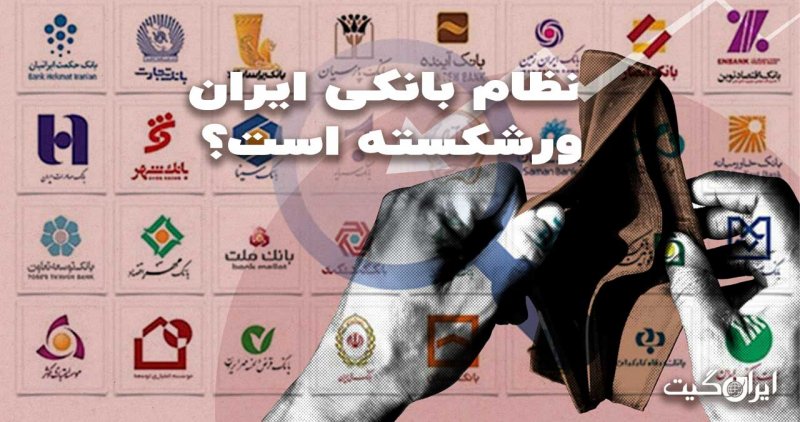The Iranian banking system is bankrupt.
The Iranian banking system is bankrupt. According to Iran Gate, the issue of inefficiency and the unfavorable condition of Iranian banks has always been a topic of discussion in economic academic circles for years. Recently, strange plans have been implemented by the parliament and government, which have once again raised the issue of bank bankruptcy.
The Iranian banking system has currently entered a very difficult and sensitive phase, in such a way that many experts believe that if the country’s monetary and banking policymakers cannot make reasonable, scientific, and operational decisions at this time, certainly no pleasant outcome awaits the banking system and consequently the Iranian economy.
The macroeconomic variables in Iran indicate the dire state of banks, which are the main pillar and core of the country’s economy. It can generally be said that a bank-centric system governs the entire Iranian economic system. However, the banking system has always been targeted by decisions over the past four decades that have been mostly made with ideological and populist backing.
Among these decisions, one can point to the suppression of bank interest rates, corruption in the country’s banking system, direct and indirect government borrowing from banks, and pressure to provide unsecured loans and banking entrepreneurship.
Interest rate suppression
One of the issues that economists always emphasize to draw attention to a massive economic crisis is the suppression of bank interest rates. At times, like what we are witnessing these days, governments lower or raise interest rates by decree for various goals and purposes. Currently, interest rate suppression is apparently being carried out with slogans such as Islamic banking, interest-free banking, and combating corruption in banks.
However, the reality is different. The government of Ebrahim Raisi has so far proven that it neither has a specific idea for managing the economy nor the capability to implement the same unhealthy and unreasonable policies of the past. The grand promises he made during the election period have now caught up with him, making his task more difficult. For example, one of the areas putting a lot of pressure on Raisi is the harmed shareholders of the capital market. These shareholders, who had pinned their hopes on the thirteenth government, now have very high expectations from the cabinet, including the suppression of interest rates to attract idle capital to the stock market.
Last year, the Ministry of Economy, under pressure from stock market participants, took action to limit the interest rate to below 20%.
This is while the interest rate channel is recognized in economics as a tool for controlling inflation. However, economists believe that in a situation where inflation in Iran exceeds 42%, the interbank interest rate fluctuates within a narrow range below 20%.
In other words, the interest rate in the money market is about negative 20%, meaning that given the inflation rate, the money market is in a poor state, which has led to widespread corruption. On the other hand, this equation has been detrimental to banks, and only some bank managers, by exploiting the circumstances, are trying to make a profit for themselves.
Who gave the loan and who took it?
Ebrahim Raisi is caught in a predicament where his grandiose election slogans have made his job more difficult. The promises Raisi made to his audience have now caught up with his government, and it seems they are grasping at any straw to escape this pressure.
Among the actions taken by the thirteenth government in this regard is the imposition of unregulated and unprincipled pressure on state and non-state banks to provide loans to applicants. Meanwhile, banks are severely criticizing this government approach and are trying to evade the government’s orders by any means possible.
Economists believe that the government has put banks in a situation where imbalances have been severely exacerbated. The issue of indirect government borrowing from the central bank has caused severe pressure on this monetary and banking policymaker and consequently on state and private banks.
Moreover, the parliament has passed the Youth Population Plan, which is based on providing marriage loans and increasing fertility rates. This situation has led to numerous reports being sent to the media about banks refusing to provide loans to applicants and those eligible for loans.
Bankruptcy is a reality.
Given the described conditions, it can be said that the country’s banking system is also on the brink of collapse or the same downfall. However, if we look a little more fundamentally at the state of the country’s banking system, we will realize the severity of the situation. The issue of interest-free banking and the plan recently approved by the parliament have also significantly increased these concerns.
The overdraft of banks, which has become a routine matter, has now caused a super-crisis. A super-crisis that can lead to a disastrous outcome. Additionally, the government’s pressure on the banking system and the parliament’s unprincipled plans pave the way for the banking system to fall into the abyss of overdraft and monetary base growth, an abyss that will result in nothing but intensified inflation and hardship for various segments of society.
In this context, reports and analyses have been published in Iran Gate, a few of which are listed for your convenience.
- Who is the face behind the Central Bank?
- Iran’s economy is bankrupt, part two.

